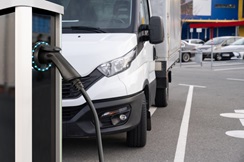Can Insurance Companies Help Pave the Road for Vehicle Fleets to Go Electric?
(blank)
Can Insurance Companies Help Pave the Road for Vehicle Fleets to Go Electric?
As the UK strives towards net-zero carbon emissions, many large companies are recognising their own responsibilities in working towards that goal. As such, many nationwide organisations are changing their petrol and diesel vehicle fleets to battery electric vehicles. Organisations pledging to make their fleets fully electric by 2030 include Royal Mail, Tesco, BT and Scottish Power. They, in turn, are holding the government accountable for ensuring the transition can run smoothly, with the right infrastructure in place to allow the changeover process to be straightforward.[i]
The Government has responded with a range of measures which include commitments to increasing the number of charging points, as well as various tax breaks and incentives, both to employers running electric vehicles, and to employees if they run an electric vehicle as a benefit in kind.
Motor fleet insurance
As companies start to purchase electric cars and vans, rather than petrol or diesel, one important consideration for them is the ease of insuring such vehicles. The commercial insurance sector has been quick to respond to the growing electric market but needs to continue to improve the insurance offering as the sector continues to grow.
A large market
In the UK now, the RAC estimates that there are around 712,000 zero emission electric vehicles in the UK. Throughout 2022, around 267,000 battery operated vehicles were registered, up from around 191,000 in 2021 and 108,000 in 2020.[ii] Covid, and other world events, slowed the distribution of electric vehicles at the beginning of the 2020s, but the market is now regaining momentum.
As these figures increase, insurance companies should be responding. Underwriters will need to continue to assess the risks as more data about electric vehicles becomes available, while insurance brokers will be advising fleet owners and managers on the most suitable insurance and making sure that all they are not under insured.
Although running costs are lower for electric vehicles, there are some additional considerations which have - to date – made electric vehicles more expensive to insure.
Repair costs
Repair costs can be higher for electric vehicles, as fewer garages specialise in their repair. Initially, insurers were extremely cautious about the potential costs of repairs, resulting in over inflated insurance costs. However, as electric vehicles become the norm, and underwriters have a bank of data to look at regarding repair costs, insurance premiums should continue to reduce, in line with an increasing number of independent garages that will work on electric vehicles.
The risks
Electric vehicles are not difficult to drive, but the heavier weight can mean that braking distances are further than on standard vehicles, so additional care needs to be taken to maintain appropriate stopping distances.
Fire was initially considered to be a larger risk in plug in electric vehicles than in petrol and diesel vehicles. However, data now suggests that this is not true. It appears, in fact, that petrol and diesel vehicles are around 4.5 times more likely to catch fire. [iii]
Although an electric car fire might burn hotter and be more difficult to put out, it is less likely to occur. Keeping a vehicle in good condition, responding quickly to any warning lights and assessing a vehicle after an impact all reduces the risks of fire hazard (as well as being good safety practice for any vehicle owner).
With electric vehicles being so new, they often include all the latest anti-theft devices, and so thieves are likely to target easier vehicles. That said, there have been thieves targeting the copper charging cables, as they are easy to access and to sell.
Mitigating the issues
Although we have highlighted the additional risks above, and these have pushed the costs of electric vehicle insurance up, it is possible to reduce these risks considerably. As the risks reduce, in time, insurance premiums for electric vehicles will also continue to reduce until, hopefully, they are in line with standard vehicles.
Risks around braking distance, can be mitigated by requiring that all drivers having an additional driving training course, prior to driving an electric vehicle.
All software needs to be kept up to date to monitor the batteries wellbeing, and any problems with the battery needs to be investigated and dealt with immediately.
Suitable security needs to be in place in the location where the cars are charging overnight, to reduce the risk of opportunistic thieves stealing valuable charging cables.
Supporting businesses to go electric
There are multiple benefits to large companies running fleets of electric vehicles; the positive impact on the environment being the most obvious factor. There are other advantages too. Electric vehicles are cheaper to run, and currently governments offer good incentives for companies and individuals to choose electric vehicles. As businesses begin to play their part in working towards zero carbon output, it is vital that commercial insurance companies support them in their efforts, making electric motor fleet insurance easy, affordable and fit-for-purpose.
As commercial insurance companies look to improve their insurance products for the electric fleet vehicle market, it is important to have the right staff members in place to develop this specialism. As a specialist insurance recruitment agency, Aston Charles is ideally placed to provide candidates that have a wide range of skills and experience in all new and emerging insurance markets. Contact us today to discuss your recruitment requirements.
[i] Randall, C. (2021) Seven British companies pledge to electrify fleets by 2030, electrive.com. Available at: https://www.electrive.com/2021/07/31/seven-british-companies-pledge-to-electrify-fleets-by-2030/ (Accessed: March 31, 2023).
[ii] The road to electric - in charts and data (no date). Available at: https://www.rac.co.uk/drive/electric-cars/choosing/road-to-electric/ (Accessed: March 31, 2023).
[iii] Business considerations for fleet managers (no date). Available at: https://www.allianz.co.uk/news-and-insight/insight-and-expertise/business-considerations-for-fleet-managers.html#business (Accessed: March 31, 2023).









